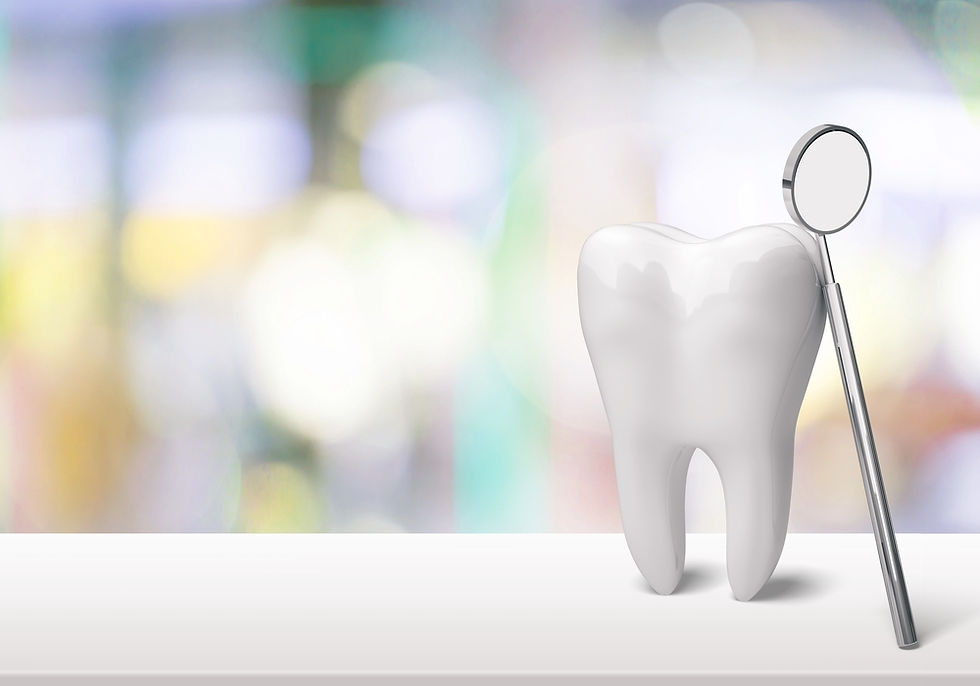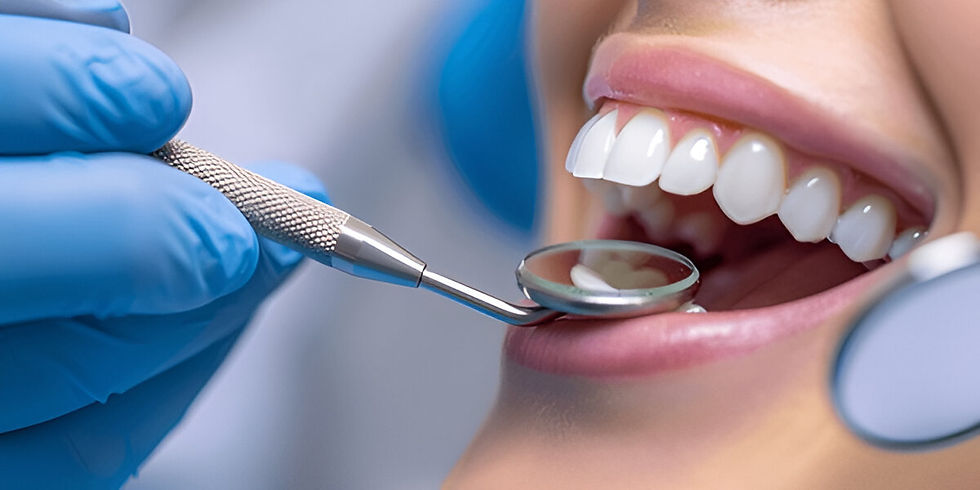How a Dentist Can Help You Get a Brighter, Whiter Smile?
- Kiara Waylen
- Aug 7, 2025
- 4 min read
Do you cover your mouth when you laugh or avoid photos because you’re self-conscious about your teeth? A bright, white smile isn’t just about appearances—it boosts confidence, creates positive first impressions, and helps you feel your best. If you're looking for a real transformation, professional teeth whitening could be the solution.

In this guide, we’ll cover why teeth become stained, how professional whitening works, what it costs, who it’s for, and how to keep your smile shining long after treatment.
Why Do Teeth Become Discoloured?
Tooth discolouration is common and can happen for many reasons.
Common Causes
· Coffee, tea, and red wine: These contain tannins that stain enamel.
· Smoking: Nicotine and tar cause stubborn yellow-brown stains.
· Ageing: As enamel thins, the yellow dentin underneath becomes more visible.
· Medications: Tetracycline and other drugs can darken teeth, especially if used during childhood.
· Genetics: Some people naturally have whiter or thicker enamel.
Types of Stains
· Extrinsic stains: Surface stains from food, drinks, or smoking. These respond well to whitening.
· Intrinsic stains: Discolouration within the tooth, often from trauma or medication. These are harder to treat but can still be improved with professional help.
Professional Whitening Options & Costs
In-Chair Whitening
Performed in the clinic, this option offers immediate results. It typically costs $500–$1,500, with most falling around $600–$800. Premium systems with LED lights or advanced gels may be more expensive.
Take-Home Kits
These dentist-prescribed kits use custom trays and professional-strength gel. Expect to pay $300–$600. Many clinics offer package deals combining both in-chair and take-home treatments for around $800–$1,200.
Factors That Influence Pricing
· Severity and type of staining
· Dentist’s expertise
· Technology and materials used
· Geographic location
While the cost may seem high compared to supermarket products, professional whitening is safer, more effective, and longer-lasting.
Who’s a Good Candidate?
Ideal Candidates
· Healthy teeth and gums
· Extrinsic staining (from lifestyle factors)
· Good oral hygiene habits
· Willingness to maintain results
Younger patients often see more dramatic results, but people of any age can benefit.
When Whitening May Not Be Suitable?
· Pregnant or breastfeeding women
· Patients with gum disease or worn enamel
· Teeth with intrinsic stains from trauma or medications
· Teeth with crowns, veneers, or large fillings (as these won’t whiten)
Always consult your dentist to ensure whitening is safe and effective for you.
Alternatives to Whitening
If you're not a candidate for bleaching, other cosmetic options are available:
· Dental bonding: Covers discoloured teeth using tooth-coloured resin.
· Porcelain veneers: Thin shells that cover the front of teeth. Ideal for severe staining or structural concerns.
· Microabrasion: Removes minor surface stains.
· Crown replacements: For updating old, discoloured restorations.
Your dentist can help choose the right solution for your needs and goals.

Maintaining Your Brighter Smile
Professional whitening results can last years with proper care.
Daily Habits
· Brush twice daily with non-abrasive whitening toothpaste
· Use floss and rinse after meals
· Avoid smoking and limit staining drinks
· Drink through a straw when consuming dark beverages
· Rinse with water after consuming stain-causing foods or drinks
Foods to Avoid
· Coffee, tea, red wine, dark juices, cola
· Tomato sauce, soy sauce, berries, curry
You don’t need to eliminate these completely—just consume them wisely. Rinsing or brushing afterward helps reduce staining.
Helpful Foods
· Crunchy fruits like apples
· Dairy products
· Celery and carrots (natural cleaners)
· Strawberries (contain natural whitening agents)
Touch-Ups & Long-Term Maintenance
Most patients benefit from whitening touch-ups every 6 to 12 months, depending on lifestyle and habits. Take-home trays can be reused for years, making maintenance affordable and easy. Watch for dullness or returning stains—those are your cues it’s time to refresh.
Common Concerns: Side Effects & Safety
Tooth Sensitivity
Temporary sensitivity is common and usually peaks within 24–48 hours. It’s manageable with desensitising toothpaste, fluoride rinses, and avoiding hot or cold foods right after treatment.
Gum Irritation
Gels that contact the gums can cause mild irritation. Dentists use protective barriers during in-chair treatments, and custom trays for at-home use help reduce risk.
Realistic Expectations
Not everyone will achieve ultra-white results. Your natural enamel colour, age, and type of staining all affect the outcome. Existing dental work won’t whiten, so you may need replacements for a uniform look.
Beyond Whitening: Other Smile Enhancements
Veneers
Porcelain veneers can reshape and dramatically whiten teeth that won’t respond to bleaching. They’re more expensive and permanent but offer stunning, long-lasting results.
Bonding & Contouring
Great for small chips, gaps, or stubborn stains. These procedures can be used with whitening for a polished, symmetrical smile.
Complete Smile Makeovers
For comprehensive changes, dentists may combine whitening with orthodontics, veneers, gum reshaping, or crown replacements. Digital smile design tools can preview your transformation before you commit.
Ready to Transform Your Smile?
A professional whitening treatment can dramatically improve your appearance and confidence. Whether you're preparing for a big event or just want to love your smile again, talking to your dentist is the first step.
During your consultation, your dentist will:
· Assess your teeth and oral health
· Discuss your goals and concerns
· Recommend a personalised treatment plan
Investing in your smile is an investment in yourself. With the right care and guidance, your dream smile is within reach—brighter, whiter, and uniquely yours.




Comments